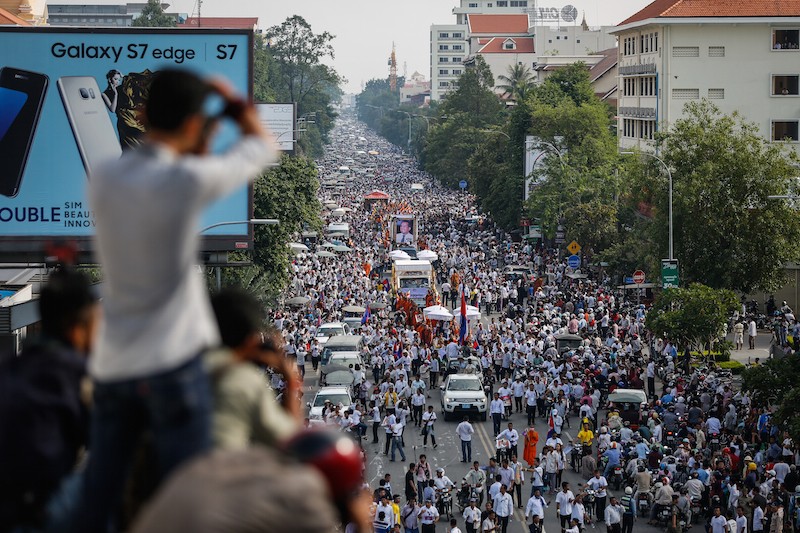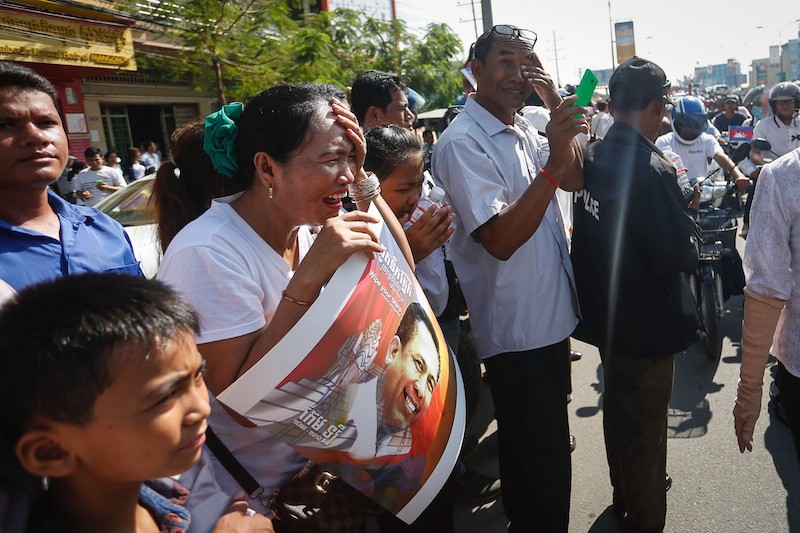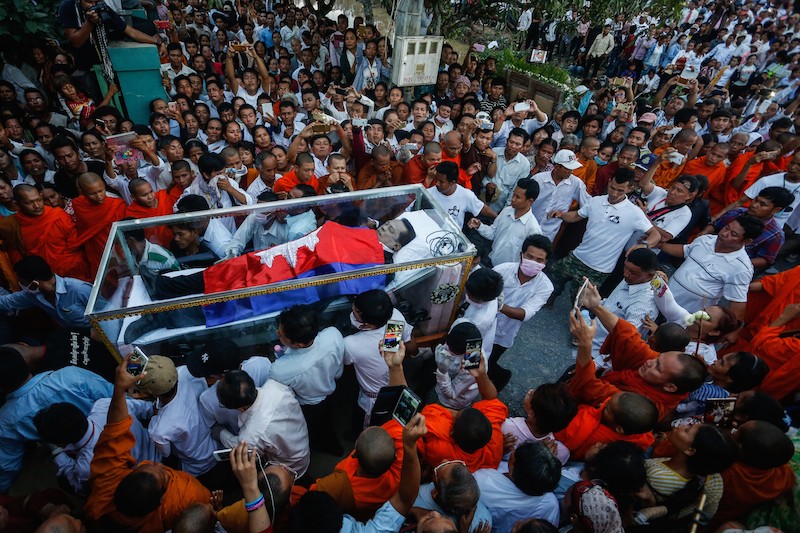Tram Kak district, Takeo province – Tens, if not hundreds, of thousands of mourners followed Kem Ley’s body from Phnom Penh to his provincial hometown on Sunday as thousands more lined the way for what was the largest funeral procession Cambodia has seen since the royal cavalcade for the late King Norodom Sihanouk in 2013.
They had come to pay their respects to the popular political analyst, who, at the age of 46, was gunned down while drinking his morning coffee at a favorite convenience store in Phnom Penh on July 10.

Though the man arrested for the murder claims to have acted in rage over a $3,000 debt he was owed, Kem Ley’s death has been broadly felt as an attack on the democratic principles he worked to promote as an analyst, researcher, commentator and government critic.
After leaving Phnom Penh’s Wat Chas pagoda shortly after dawn, the hearse bearing his body crawled through the city and along National Road 3 at a snail’s pace—a train of vans, cars and motorbikes snaking slowly behind it for several kilometers—before arriving at his mother’s home in Takeo’s Angtakob village by dusk.
As the government had asked, the event remained apolitical—at least on the surface. Mourners and onlookers waved smiling portraits of Kem Ley along with Cambodian and Buddhist flags and bouquets of fresh-cut lotus buds.
But scratch at the surface, ask anyone who attended, and there were no doubts that Kem Ley died for speaking his mind, another victim of the country’s string of political assassinations.
Sum Phan, a university student who often heard the analyst speak on the radio, said Kem Ley had died a martyr.
“He died for the Cambodian people. He dared to sacrifice his life. He dared to speak the truth,” said Mr. Phan, who had donned a crisp white shirt emblazoned with Kem Ley’s face to watch the procession roll past.
“I totally believe it was politically motivated, because his analyses strongly affected the powerful people,” he said. “He spoke about border issues, about immigration from Vietnam, economic land concessions and deforestation.”
Prime Minister Hun Sen has taken on the accusations and denied them flatly, insisting that the government would not have ordered the murder because it had the most to lose from the backlash.
But the premier’s case gained no traction among Sunday’s mourners.
The size of the crowd may have recalled the late king’s funeral procession three years ago. But in spirit, it harked back to the funeral march for union leader Chea Vichea, who, like Kem Ley, was gunned down in a brazen daytime shooting with all the hallmarks of an ordered hit.
“I don’t believe the man they arrested is the real killer,” said Moeung Dara, waiting for Kem Ley’s body to pass. “I strongly believe it was politically motivated because it is the same thing over and over again.”

Like many others, Mr. Dara said he came to know Kem Ley by way of his frequent guest appearances on the country’s few independent radio stations after the 2013 national election.
“I liked to listen to him. He spoke the truth and he was honest about deforestation, land grabbing and human rights violations,” he said. “I came here today because I am very hurt. Khmer have killed Khmer.”
Some of Kem Ley’s colleagues and fans say his popularity stemmed from a knack for translating political events into language the masses could readily grasp. Not long before his murder, he posted a series of political “jokes” to his Facebook page, biting jabs at the establishment dressed up as pithy anecdotes of country life—astute satire in the vein of George Orwell’s “Animal Farm.”
He had announced plans for 99 of the posts, and to have them collected into a book by year’s end, but made it through only 19.
Seated under a tent at Kem Ley’s family home, Prak Sam Eng, who had traveled from Prey Veng province for the funeral, said the slain analyst had a gift for straight talk.
“He got right to the point about the people who did bad things,” she said. “It was easy to understand what he said. He used simple language that ordinary people could understand. That’s why so many people have come to join the funeral.”
Like nearly everyone else, Ms. Sam Eng was convinced the analyst’s murder was political.

“I once heard Kem Ley say on the radio that he had been threatened but that he was not afraid because he had three visas: one for the hospital, one for jail and one to sleep at the pagoda.”
“In my heart, I loved him,” she said. “He protected the nation and the land. He had no weapons to threaten anyone. He was a good person.”
As night fell on the family home, a steady stream of mourners continued to file in and out of the grounds for a last look at Kem Ley through the glass case in which he arrived, his body draped in his country’s flag.
The funeral committee’s original plans were to transfer the body to a wooden coffin and bury it in a cement-lined grave in the backyard this morning. Last night, relatives said the burial might be delayed, though others on the committee said it would go ahead as planned.



